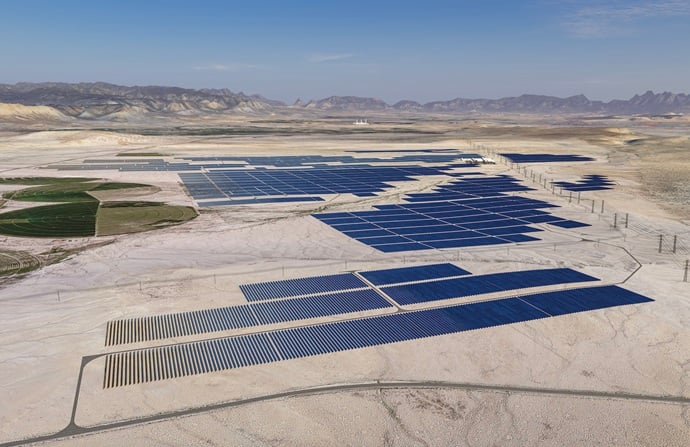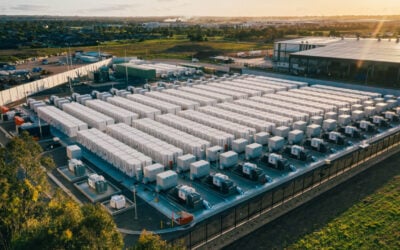
A news roundup focusing on FlexGen’s recent partnership with Rosendin, Energy Vault and Jupiter Power’s continued development and assistance from Stem Inc. for rPlus Energies.
FlexGen partners with Rosendin to integrate BESS with data centres
System integrator FlexGen Power Systems has partnered with electrical contracting company Rosendin to integrate utility-scale battery energy storage systems (BESS) with data centres.
FlexGen says that using BESS at the data centres allows the centres to run without the need for traditional uninterruptible power supply (UPS) infrastructure.
The companies claim this is possible because of Rosendin’s ‘BESSUPS’ design and FlexGen’s ‘Soft Grid Interconnection’ and ‘Island Grid Transient Frequency Stabilisation’ patents.
Try Premium for just $1
- Full premium access for the first month at only $1
- Converts to an annual rate after 30 days unless cancelled
- Cancel anytime during the trial period
Premium Benefits
- Expert industry analysis and interviews
- Digital access to PV Tech Power journal
- Exclusive event discounts
Or get the full Premium subscription right away
Or continue reading this article for free
According to FlexGen, the BESSUPS system provides uninterrupted power on a massive scale while avoiding using generators.
Through grid-connected test, FlexGen and Rosendin are looking to prove three main points:
- Current grid-forming power conversion system (PCS) technology can satisfy rapid response and waveform control requirements.
- Updates to the existing AC PCS firmware enhancements from original equipment manufacturers (OEMs) will enable seamless UPS replacement functionality.
- Utility-scale BESS can back crucial loads, boost reliability, and ease the shift between grid-connected and islanded operations.
FlexGen has a background in developing microgrids in remote areas for customers such as the US military. This experience may come in handy as the company works to build out these reliable systems with Rosendin.
The collaboration will also see FlexGen using its HybridOS energy management system (EMS).
Energy Vault to supply additional BESS for Jupiter Power in ERCOT
System integrator Energy Vault and developer Jupiter Power have signed an agreement to supply an additional 100MW/200MWh BESS at a Jupiter site in the Electric Reliability Council of Texas (ERCOT) market.
In July 2024, Jupiter Power put into commercial operation the St Gall BESS, a 100MW/200MWh system provided by Energy Vault, in Fort Stockton, Texas.
Energy Vault says construction of the BESS is underway and is expected operational by the end of summer 2025.
The BESS will be built with Energy Vault’s UL9540-certified B-Vault solution, which is AC and DC-coupled. The system will also use the VaultOS EMS for BESS operations.
Energy Vault and Jupiter Power have been involved in an ongoing partnership. In 2022, the companies signed a memorandum of understanding (MOU) to secure 2.4GWh of supply chain equipment and services through Energy Vault’s hardware and software management platform in Jupiter Power’s BESS projects.
Shortly after that announcement, Energy Vault also announced it would construct and commission a 10MW/20MWh BESS for Jupiter in Cerpinteria, California.
Energy Vault has been recognised for its gravity-based long-duration energy storage (LDES) solutions. However, in recent years, it has expanded into deploying BESS and green hydrogen energy storage projects.
Last September, the company received a notice from the New York Stock Exchange (NYSE) that it did not comply with NYSE’s listing standards due to its stock price falling below US$1.00 over a 30 trading-day period.
Energy Vault has six months to regain compliance with the NYSE and has noted that it intends to consider available alternatives, subject to stockholder approval.
Stem Inc. providing engineering and design support with rPlus Energies in Utah
Pioneer of the US commercial and industrial (C&I) BESS sector, Stem Inc. has announced it will provide engineering advisory and design support for rPlus Energies’ Green River Energy Centre.
Stem will provide multiple services, including energy storage metering configuration, review of power flow scenarios and auxiliary load assumptions for the 400MW/1,600MWh BESS, part of developer rPlus Energies’ solar-plus-storage complex in Eastern Utah.
The company’s recently reported Q1 2025 GAAP gross profit was US$10.5 million. In comparison, the company reported a Q1 2024 GAAP gross profit of US$-24.2 million.
Stem attributed this improvement to expanding its software-driven controls and optimisation of clean energy assets and a pivot away from battery storage hardware sales, as part of an ongoing change in strategic direction. The company received a similar NYSE listing notice to Energy Vault at around the same time last year.
The company claims to have over 1,000 operational or contracted BESS sites in its customer service portfolio and recently helped develop Green River Energy Centre’s network and supervisory control and data acquisition (SCADA) design.
In July 2024, rPlus Energies announced it had secured more than US$1 billion for the Green River Energy Centre project. The project started construction Q3 2024 and it features 400MWac of solar PV generation integrated with the BESS.
Stem president of professional services, Jake Berlin seemed to echo the company’s revised approach, saying of its recent announcement:
“This milestone highlights Stem’s dedication to building a sustainable future, fostering innovation, and accelerating the energy transition. Our role as consultant and service provider enables us to continuously deliver expert guidance to advance large-scale renewable energy projects and support our clients in achieving their clean energy objectives.”





